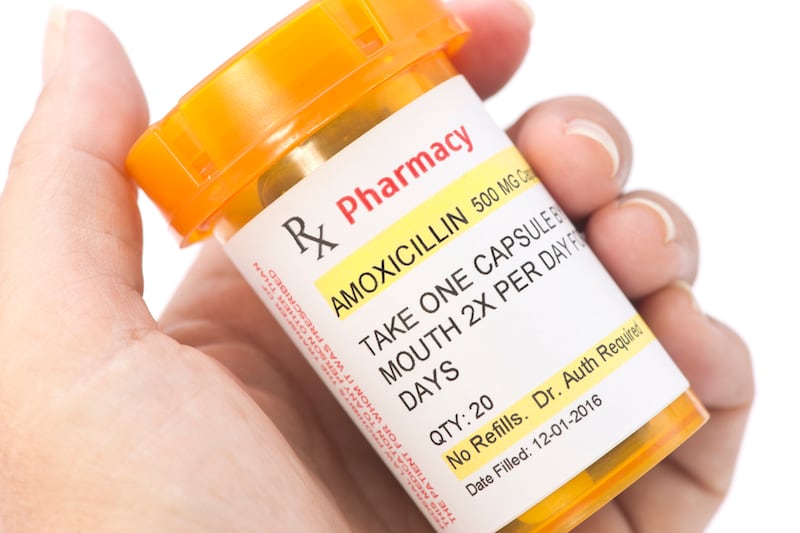When Amy Curtis’ 9-year-old son was diagnosed with an ear infection after several days of a persistent fever, she received what most parents get from their pediatrician in this situation: a prescription for antibiotics.
It’s a common experience for parents, but recently it’s taken a twist, with shortages of antibiotics striking pharmacies around the country.
Curtis told me about the runaround she experienced just to fill the prescription, “(Urgent care prescribed) me cefdinir, because he said amoxicillin was back-ordered nationwide. We went to the nearest 24-hour pharmacy, and the technician said they did not have cefdinir in any store. I was in the drive-through so he said I should call urgent care and get it changed and they might be able to find amoxicillin.”
Eventually, after getting the pharmacist and urgent care on the phone, and multiple phone calls to other pharmacies, Curtis obtained amoxicillin for her son. But her experience and that of others is worrisome to pediatricians like Dr. Kristen Walsh in New Jersey.
Walsh told me the shortages are becoming a “sizable problem” in her practice, with more patients being prescribed alternative antibiotics that are more “broad spectrum,” meaning they are more powerful and able to wipe out a broader range of bacteria. But these drugs can lead to population-wide antibiotic resistance and wreak havoc on the digestive systems of young children.
Meanwhile, parents around the country are having to run around to different pharmacies to find one with any kind antibiotics in stock. Two other pediatricians, one in northern Virginia and one at a Midwestern children’s hospital, told me they are reluctantly doing the same as Walsh, despite their concern about the use of broad-spectrum drugs.
Additionally, Walsh, who works with low-income mothers with limited access to a car, as well as mothers living in shelters, told me, “There’s an access issue here that’s troubling.” Spending hours driving to different stores isn’t an option for these moms.
Why are we suddenly seeing a shortage of this vital medication? Experts describe a perfect storm: After two years of the pandemic, with limited exposure to others, children are being hit with a surge of respiratory viruses that their immune systems are ill-equipped to fight off.
The surge in viral infections has also created a surge in secondary bacterial infections and created unprecedented demand for antibiotics to treat them. Access to these drugs is incredibly important for keeping the strains out of hospitals, Walsh told me, because “if you’re trying to treat kids outpatient and keep them out of the hospital, high-dose amoxicillin is the standard course of treatment.”
Children’s health and pediatric groups this week called for the Biden administration to declare a national emergency to free up resources to combat the effects. NBC News reported on the Biden administration’s response, which was surprisingly tepid given its struggles with the formula shortage earlier this year:
“In a statement responding to pressure from the Children’s Hospital Association, the American Academy of Pediatrics and other groups, a Biden administration official said that ‘public health emergencies are determined based on nationwide data, science trends, and the insight of public health experts.’
“The official said the administration is ‘ready to provide assistance to communities who are in need of help on a case-by-case basis’ and encouraged people to take preventive action, such as ‘avoiding close contact with people who are sick, staying home when sick, covering coughs and sneezes, and staying up to date on their flu and COVID-19 vaccines to prevent the spread of infectious diseases.’”
In other words: Don’t get sick.
Unfortunately, for many families, that ship has already sailed. Pediatric units across the U.S. are overwhelmed by an unseasonably early surge of respiratory viruses among babies and toddlers, including RSV and the flu. Some parts of the country have completely run out of pediatric beds.
Two of the three pediatricians I spoke with about the antibiotic shortages referred to the baby formula shortage, which is still an ongoing issue according to Walsh.
That crisis was made worse by the Biden administration’s bumbling. On May 13, the administration claimed it couldn’t have anticipated the crisis (borne of recalls that the FDA called for), and that the federal government was powerless to step in. Just five days later, as pressure mounted, the administration discovered it wasn’t actually powerless, as it invoked the Defense Production Act to ramp up production.
After finding themselves placed last on the list of national priorities during the pandemic, children are again finding themselves in the same position amidst the respiratory virus surge and the antibiotic shortage. The Biden administration is repeating the same mistakes it made with the formula shortage, shrugging its shoulders as experts in pediatric health beg for help.
Families only found relief with their formula woes when the public pressure became too great to ignore; it should be wholly unnecessary for the same scenario to play out again in order to keep children safe this winter.
Bethany Mandel is a contributing writer for Deseret News. She is a home-schooling mother of five and a widely published writer on politics, culture and Judaism. She is an editor for the children’s book series “Heroes of Liberty.”


 alt=Bethany Mandel
alt=Bethany Mandel